下英语重点词句复习汇总
小学四年级下英语复习资料M1-M10
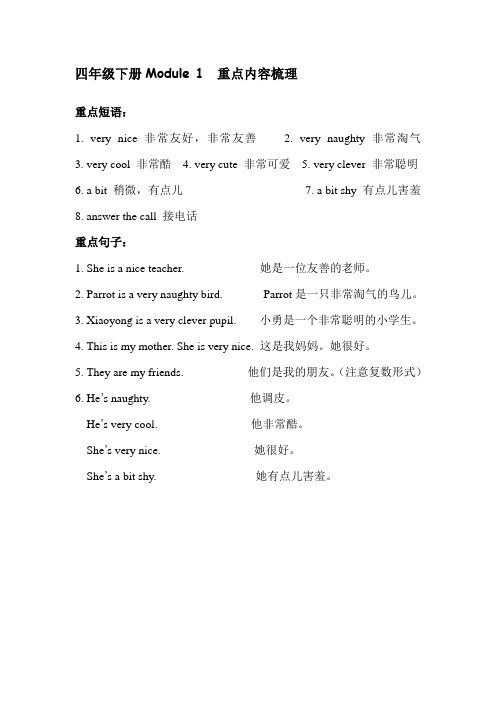
重点短语:1. very nice 非常友好,非常友善2. very naughty 非常淘气3. very cool 非常酷4. very cute 非常可爱5. very clever 非常聪明6. a bit 稍微,有点儿7. a bit shy 有点儿害羞8. answer the call 接电话重点句子:1. She is a nice teacher. 她是一位友善的老师。
2. Parrot is a very naughty bird. Parrot是一只非常淘气的鸟儿。
3. Xiaoyong is a very clever pupil. 小勇是一个非常聪明的小学生。
4. This is my mother. She is very nice. 这是我妈妈。
她很好。
5. They are my friends. 他们是我的朋友。
(注意复数形式)6. He’s naughty. 他调皮。
He’s very cool. 他非常酷。
She’s very nice. 她很好。
She’s a bit shy. 她有点儿害羞。
重点单词及短语:1. Buckingham Palace 白金汉宫2. Big Ben 大本钟3. Hyde Park 海德公园4. Tower Bridge 塔桥5. a big city 一个大城市6. a small village一个小村庄7. very big and beautiful 很大很漂亮8. very famous and beautiful 很有名很漂亮9. about London 关于伦敦10. be close to 接近,靠近......11. whose house 谁的房子12. the Queen’s house 女王的房子重点句子:1. London is a big city. 伦敦是个大城市。
2. This is a book about London. 这是一本关于伦敦的书。
(完整word版)三年级英语下册复习资料

(完整word版)三年级英语下册复习资料Starter unit1. Clap your hands. 拍手2.Jump up high. 高高跳起3. Shake your arms and your legs. 挥挥你的胳膊,摆摆你的腿4. Bend your knees. 弯曲膝盖5. Touch your toes. 摸脚趾6. Stand nose to nose. 鼻对鼻站7- Good morning. - Good morning. 早上好/ 上午好8. - Good afternoon. - Good afternoon. 下午好9. - Good evening. -Good evening. 晚上好10. - Good night. -Good night. 晚安11. Welcome back. 欢迎回来。
12. It’s good to see you again. 又见到你真高兴。
13. Dance with me. 和我一起跳舞。
14. Sing with me. 和我一起唱。
15. Let’s play a gam e. 让我们做游戏。
Unit1 pets一.识记62页animals的单词。
(cat,dog,fish,mouse/mice,frog,rabbit,hamster,bird, budgie, giraffe, elephant, monkey, panda, bear)二. 重点词句。
1. - Have you got a pet? 你有个宠物吗?-肯定回答:Yes, I have. 有。
-否定回答:No, I haven’t. 没有。
2. -What have you got? 你有什么宠物?- A cat and a dog. 一只猫和一只狗。
3. 人名’s 某人的什么东西。
Julia’s cat is black and white. 朱丽娅的猫是黑色和白色的。
八年级下册英语重点单词重点句子。

八年级下册英语重点单词重点句子。
以下是八年级下册英语的一些重点单词和句子,供您参考:重点单词:1. opportunity(机会)2. skill(技能)3. experience(经验)4. education(教育)5. qualification(资格)6. opportunity(机会)7. responsibility(责任)8. enthusiasm(热情)9. challenge(挑战)10. success(成功)重点句子:1. I want to take this opportunity to thank you for your support.(我想借此机会感谢你的支持。
)2. She has a lot of skills and experience in this field.(她在这个领域有很多技能和经验。
)3. They are looking for someone with good communication skills.(他们正在寻找具有良好的沟通能力的人。
)4. I think this job would be a great opportunity for me to learn and grow.(我认为这份工作对我来说是一个学习和成长的好机会。
)5. She has a lot of enthusiasm and is always ready to take on new challenges.(她充满热情,随时准备迎接新的挑战。
)6. He has a lot of responsibilities at work and is always reliable.(他在工作中有很多责任,并且总是可靠的。
)7. She is very qualified for this position and has the necessary skills and experience.(她非常符合这个职位的要求,并且拥有必要的技能和经验。
六年级英语下册下册知识点

六年级英语下册下册知识点六年级英语下册知识点一、词汇:1. 动词短语:- go swimming: 去游泳- play basketball: 打篮球- watch TV: 看电视- do homework: 做作业- listen to music: 听音乐- read books: 读书- eat breakfast/lunch/dinner: 吃早餐/午餐/晚餐- have a picnic: 去野餐2. 名词短语:- sports day: 运动会- summer vacation: 暑假- school trip: 学校旅行- science experiment: 科学实验 - English club: 英语俱乐部- math competition: 数学竞赛3. 形容词:- happy: 开心的- tired: 疲劳的- interesting: 有趣的- difficult: 困难的- exciting: 令人兴奋的- important: 重要的二、语法:1. 一般现在时:- 构成:主语 + 动词原形- 例句:I go to school every day.(我每天去学校。
)- 特殊疑问句:What do you do on weekends?(你周末做什么?)- 否定句:I don't like playing basketball.(我不喜欢打篮球。
)2. 一般过去时:- 构成:主语 + 动词过去式- 例句:I watched a movie last night.(昨晚我看了一部电影。
) - 特殊疑问句:What did she do yesterday?(她昨天做了什么?)- 否定句:He didn't go to the park yesterday.(昨天他没有去公园。
)3. 现在进行时:- 构成:主语 + am/is/are + 动词-ing形式- 例句:We are playing tennis now.(我们正在打网球。
七年级下册英语1-12单元重点单词重点短语重点句子

七年级下册英语1-12单元重点单词重点短语重点句子摘要:一、前言二、七年级下册英语1-12 单元重点单词1.名词2.动词3.形容词4.副词5.介词6.代词7.连词三、七年级下册英语1-12 单元重点短语1.日常用语2.疑问句和回答3.祈使句4.感叹句四、七年级下册英语1-12 单元重点句子1.陈述句2.疑问句3.祈使句4.感叹句五、学习建议正文:一、前言英语作为一门国际化的语言,在我国的基础教育中占有非常重要的地位。
对于初中生来说,英语学习是他们学习生活中不可或缺的一部分。
本文将为大家整理七年级下册英语1-12 单元的重点单词、短语和句子,希望能对大家的学习有所帮助。
二、七年级下册英语1-12 单元重点单词1.名词(1)家庭:family, father, mother, brother, sister, teacher(2)学校:school, class, student, teacher, book(3)动物:cat, dog, fish, bird, elephant2.动词(1)表示有:have, has(2)表示吃:eat, drinks(3)表示玩:play, plays3.形容词(1)表示高兴:happy, sad(2)表示美丽:beautiful, ugly(3)表示好:good, bad4.副词(1)表示很:very, so(2)表示现在:now, today(3)表示昨天:yesterday5.介词(1)表示在...里:in, on(2)表示向...:to, toward(3)表示从...:from, away6.代词(1)表示我:I, me(2)表示你:you, your(3)表示他:he, his(4)表示她:she, her(5)表示我们:we, us(6)表示你们:you, your(7)表示他们:they, their7.连词(1)表示和:and, but(2)表示如果:if, then(3)表示因为:because, so三、七年级下册英语1-12 单元重点短语1.日常用语(1)早上好:Good morning!(2)下午好:Good afternoon!(3)晚上好:Good evening!2.疑问句和回答(1)你叫什么名字?:What"s your name?(2)你来自哪里?:Where are you from?(3)这个多少钱?:How much is this?3.祈使句(1)请打开窗户:Please open the window.(2)请给我一杯水:Please give me a glass of water.(3)请坐:Please sit down.4.感叹句(1)多么漂亮的花啊!:What a beautiful flower!(2)多么可爱的狗啊!:What a cute dog!四、七年级下册英语1-12 单元重点句子1.陈述句(1)我是一名学生:I am a student.(2)她是一名教师:She is a teacher.2.疑问句(1)你叫什么名字?:What"s your name?(2)你多大了?:How old are you?3.祈使句(1)请把书给我:Please give me the book.(2)不要说话:Don"t talk.4.感叹句(1)多么美丽的景色啊!:What a beautiful view!(2)多么好吃的水果啊!:What delicious fruit!五、学习建议1.每天坚持学习,养成良好的学习习惯。
PEP小学英语四年级上下册复习重点-单词、句型翻译、语音、语法

四年级上册各单元句型总汇,. 我们有一个新教室。
Let’s go and see 让我们一起去看看吧。
What's in the classroom? 教室里面有什么?One blackboard,one TV,many desks and chairs.Where is it ? 它在哪儿?It’s near the window. 它在窗户旁边。
It’s so big. 它很大。
Let’s clean the clas sroom。
让我们一起打扫教室Let me clean the windows。
. 让我来擦窗户。
The door is orange。
门是橙色的。
语法点:where 引导的是特殊疑问句,“哪里",看到where 就要想到地点,方位词,例如on, in ,under,near等语法点:let’s = let us 让我们let me 让我文化知识:.想问别人问题,要先说“excuse me对不起,打扰一下。
"你书包里有什么?An English book, a maths book,three storybooks and…一本英语书,一本数学书,三本故事书和I have a new schoolbag. 我有一个新书包.What colour is it? 它是什么颜色的。
It's black and white。
它是黑色和白色的.语法点:what colour引导的也是特殊疑问句,问的是颜色,回答中肯定有例如purple,red 等等。
我有一个新朋友.A Chinese friend?一个中国朋友?What’s his name ? 他的名字叫什么?His name is Zhang Peng。
他的名字叫张朋.He’s tall and strong。
Who is he ?His name is Wu Yi fan.He has short hair。
六年级下册英语重点单词句子

六年级下册英语重点单词句子一、重点单词。
1. younger [ˈjʌŋɡə(r)] 形容词(adj.),比较级形式,意为“更年轻的;更幼小的”。
2. older [ˈəʊldə(r)] 形容词(adj.),比较级形式,意为“更年长的;更旧的”。
3. taller [ˈtɔːlə(r)] 形容词(adj.),比较级形式,意为“更高的”。
4. shorter [ˈʃɔːtə(r)] 形容词(adj.),比较级形式,意为“更短的;更矮的”。
5. longer [ˈlɒŋɡə(r)] 形容词(adj.),比较级形式,意为“更长的”。
6. thinner [ˈθɪnə(r)] 形容词(adj.),比较级形式,意为“更瘦的”。
7. heavier [ˈheviə(r)] 形容词(adj.),比较级形式,意为“更重的”。
8. bigger [ˈbɪɡə(r)] 形容词(adj.),比较级形式,意为“更大的”。
9. smaller [ˈsmɔːlə(r)] 形容词(adj.),比较级形式,意为“更小的”。
10. stronger [ˈstrɒŋɡə(r)] 形容词(adj.),比较级形式,意为“更强壮的”。
11. yesterday [ˈjestədeɪ] 名词(n.),意为“昨天”。
12. last [lɑːst] 形容词(adj.),意为“上一个的;刚过去的”;也可作动词(v.),意为“持续”。
13. before [bɪˈfɔː(r)] 介词(prep.)/副词(adv.),意为“在……之前”。
14. hotel [həʊˈtel] 名词(n.),意为“旅馆”。
15. fixed [fɪkst] 动词(v.),fix的过去式,意为“修理;固定”。
16. broken [ˈbrəʊkən] 形容词(adj.),意为“破损的;弄坏了的”。
17. lamp [læmp] 名词(n.),意为“台灯”。
英语下学期总复习资料
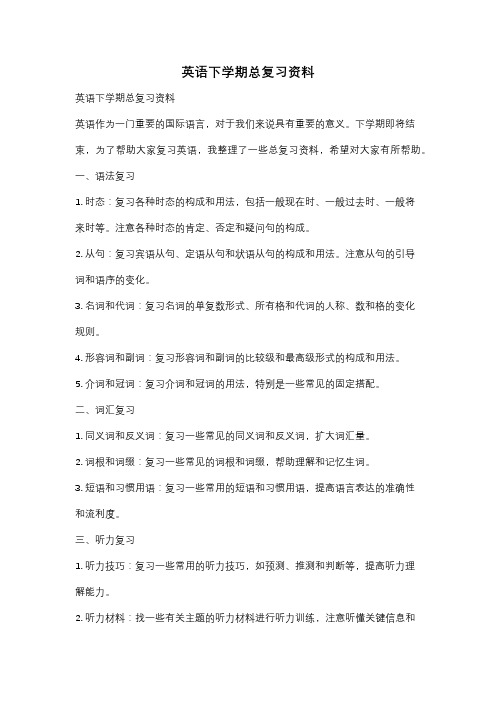
英语下学期总复习资料英语下学期总复习资料英语作为一门重要的国际语言,对于我们来说具有重要的意义。
下学期即将结束,为了帮助大家复习英语,我整理了一些总复习资料,希望对大家有所帮助。
一、语法复习1. 时态:复习各种时态的构成和用法,包括一般现在时、一般过去时、一般将来时等。
注意各种时态的肯定、否定和疑问句的构成。
2. 从句:复习宾语从句、定语从句和状语从句的构成和用法。
注意从句的引导词和语序的变化。
3. 名词和代词:复习名词的单复数形式、所有格和代词的人称、数和格的变化规则。
4. 形容词和副词:复习形容词和副词的比较级和最高级形式的构成和用法。
5. 介词和冠词:复习介词和冠词的用法,特别是一些常见的固定搭配。
二、词汇复习1. 同义词和反义词:复习一些常见的同义词和反义词,扩大词汇量。
2. 词根和词缀:复习一些常见的词根和词缀,帮助理解和记忆生词。
3. 短语和习惯用语:复习一些常用的短语和习惯用语,提高语言表达的准确性和流利度。
三、听力复习1. 听力技巧:复习一些常用的听力技巧,如预测、推测和判断等,提高听力理解能力。
2. 听力材料:找一些有关主题的听力材料进行听力训练,注意听懂关键信息和主旨要点。
四、阅读复习1. 阅读技巧:复习一些常用的阅读技巧,如快速阅读、略读和详读等,提高阅读理解能力。
2. 阅读材料:找一些有关主题的阅读材料进行阅读训练,注意理解文章的结构和主题要点。
五、写作复习1. 写作技巧:复习一些常用的写作技巧,如段落结构、句子连接和词汇替换等,提高写作表达的准确性和流利度。
2. 写作练习:找一些有关主题的写作练习,注意练习各种写作形式,如记叙文、说明文和议论文等。
六、口语复习1. 口语技巧:复习一些常用的口语技巧,如表达观点、提出建议和回应问题等,提高口语表达的准确性和流利度。
2. 口语练习:找一些有关主题的口语练习,注意练习各种口语形式,如对话、演讲和辩论等。
以上是英语下学期总复习资料的简要介绍。
三年级下册英语笔记重点归纳

三年级下册英语笔记重点归纳一、单词部分。
1. 描述人物的单词。
- tall(高的)、short(矮的;短的)、fat(胖的)、thin(瘦的)、strong (强壮的)、friendly(友好的)、quiet(安静的;文静的)。
- 例如:My father is tall and strong.(我的爸爸又高又壮。
)2. 家庭成员单词。
- father(爸爸)、dad(爸爸,口语)、mother(妈妈)、mum(妈妈,口语)、brother(兄弟)、sister(姐妹)、grandfather(爷爷;外公)、grandpa (爷爷;外公,口语)、grandmother(奶奶;外婆)、grandma(奶奶;外婆,口语)。
- 如:I love my mother.(我爱我的妈妈。
)3. 动物单词。
- cat(猫)、dog(狗)、pig(猪)、duck(鸭)、bear(熊)、elephant(大象)、monkey(猴子)、bird(鸟)、tiger(老虎)、panda(熊猫)。
- 例如:The cat is cute.(猫很可爱。
)4. 水果单词。
- apple(苹果)、banana(香蕉)、pear(梨)、orange(橙子)、watermelon (西瓜)、strawberry(草莓)。
- 如:I like eating apples.(我喜欢吃苹果。
)5. 数字单词(1 - 10)- one(一)、two(二)、three(三)、four(四)、five(五)、six (六)、seven(七)、eight(八)、nine(九)、ten(十)。
- 例如:I have three pens.(我有三支钢笔。
)6. 方位介词。
- in(在……里面)、on(在……上面)、under(在……下面)、near(在……附近)。
- 例如:The book is on the desk.(书在桌子上。
)二、句型部分。
湘少版三年级下册英语复习重点
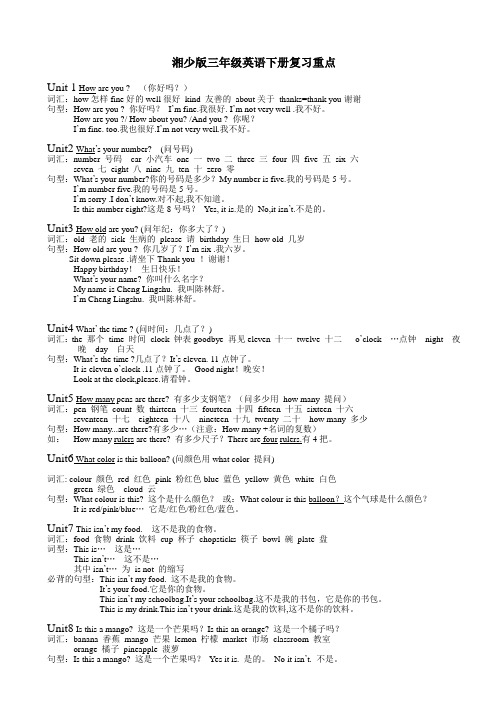
湘少版三年级英语下册复习重点Unit 1 How are you ? (你好吗?)词汇:how怎样fine好的well很好kind 友善的about关于thanks=thank you谢谢句型:How are you ? 你好吗?I’m fine.我很好. I’m not very well .我不好。
How are you ?/ How about you? /And you ? 你呢?I’m fine. too.我也很好.I’m not very well.我不好。
Unit2 What’s your number? (问号码)词汇:number 号码car 小汽车one 一two 二three 三four 四five 五six 六seven 七eight 八nine 九ten 十zero 零句型:What’s your number?你的号码是多少?My number is five.我的号码是5号。
I’m number five.我的号码是5号。
I’m sorry .I don’t know.对不起,我不知道。
Is this number eight?这是8号吗?Yes, it is.是的No,it isn’t.不是的。
Unit3 How old are you? (问年纪:你多大了?)词汇:old 老的sick 生病的please 请birthday 生日how old 几岁句型:How old are you ? 你几岁了?I’m six .我六岁。
Sit down please .请坐下Thank you !谢谢!Happy birthday!生日快乐!What’s your name? 你叫什么名字?My name is Cheng Lingshu. 我叫陈林舒。
I’m Cheng Lingshu. 我叫陈林舒。
Unit4 What’ the time ? (问时间:几点了?)词汇:the 那个time 时间clock 钟表goodbye 再见eleven 十一twelve 十二o’clock …点钟night 夜晚day 白天句型:What’s the time ?几点了?It’s eleven. 11点钟了。
七下英语u1-4重点短语复习

play the violin and the piano in the school sports club play games with people after school in my free time at the old people’s home talk to/with them make friends with them be friendly to her tell you interesting stories help with sports
发生 放弃 给我写信 等等我 出生于陕西 鼓励他 有更好的未来 给他们拍照 一个吸尘器 20分钟之内
• 1. 通常洗澡 • 2. 每天去上班 • 3. 穿衣服 • 4. 晚饭后散步 • 5. 先做作业 • 6. 上学 • 7. 上床睡觉早 • 8. 到学校晚 • 9. 起床 • 10. 锻炼
usually take a shower go to work every day get dressed take/have a walk after dinner do (one’s) homework first go to school go to bed early get to school late get up exercise/take exercise
9. 在每周六早上
every Satuday morning
10. 一周七次 11. 向某人学习
seven times a week learn from sb
1. 讲这些故事
tell these stories
2. 擅长(做)某事
be good at (doing) sth
3. 想做某事
want to do sth
八年级下册英语笔记重点归纳

八年级下册英语笔记重点归纳一、Unit 1 What's the matter?1. 重点单词。
- matter n.问题;事情。
常用搭配:What's the matter (with sb.)?(某人)怎么了?- have a cold 感冒。
类似的表达还有:have a fever(发烧),have a cough (咳嗽)等。
- stomachache n.胃痛;腹痛。
“-ache”为后缀,表示疼痛,如:headache (头痛),toothache(牙痛)。
- foot n.脚,复数形式为feet。
- lie v.躺;平躺。
lie - lay - lain。
例如:You should lie down and rest.(你应该躺下休息。
)- rest v. n.放松;休息。
如:take a rest(休息一下)。
2. 重点短语。
- take one's temperature 量体温。
例如:The nurse took my temperature.(护士给我量了体温。
)- take breaks (take a break) 休息。
We should take breaks when we are tired.(当我们累的时候应该休息。
)- get off 下车。
He got off the bus at the next stop.(他在下一站下了公共汽车。
)- to one's surprise 使……惊讶的是;出乎……的意料。
To my surprise, he passed the exam.(令我惊讶的是,他通过了考试。
)- What should I do? 我应该做什么?用于询问建议。
- You should see a dentist and get an X - ray. 你应该去看牙医并且拍个X 光片。
should为情态动词,后接动词原形,表示建议。
六下英语小升初重点词句复习公式及固定搭配复习
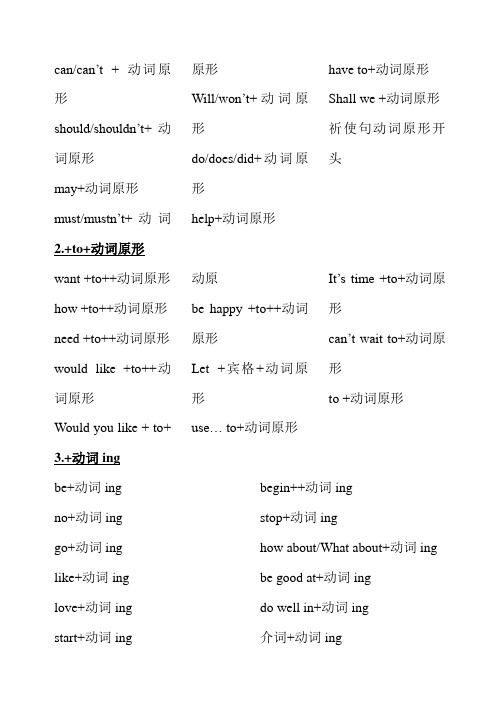
六年级毕业复习资料之固定搭配1.加动词原形can/can’t + 动词原形should/shouldn’t+动词原形may+动词原形must/mustn’t+动词原形Will/won’t+动词原形do/does/did+动词原形help+动词原形have to+动词原形Shall we +动词原形祈使句动词原形开头2.+to+动词原形want +to++动词原形how +to++动词原形need +to++动词原形would like +to++动词原形Would you like + to+动原be happy +to++动词原形Let +宾格+动词原形use… to+动词原形It’s time +to+动词原形can’t wait to+动词原形to +动词原形3.+动词ingbe+动词ing no+动词ing go+动词ing like+动词ing love+动词ing start+动词ing begin++动词ingstop+动词inghow about/What about+动词ing be good at+动词ingdo well in+动词ing介词+动词ing不是祈使句,放在句子开头的动词要加ing4.后面跟形容词的动词有:be, keep, look, feel, get, stay, become, make, smell, sound,turn.5. 量词:a lot of 许多/some一些+ 可数名词复数或不可数名词a lot 许多,后面不可跟名词,Don’t eat a lot. 不要吃太多a lot of noodles/bread 许多面条/面包some vegetables/water 一些蔬菜/水a few 几个+可数名词复数 a few eggs 几个鸡蛋a little 一点+不可数名词 a little cola 一些可乐针对上述量词提问用how many 多少many 许多+可数名词复数many toys 许多玩具much 许多+不可数名词much tea 许多茶too many 太多+可数名词复数too many students 太多学生too much 太多+不可数名词too much milk 太多牛奶6. the的用法1. 球类前面不加the play football/table tennis 踢足球/打乒乓球2. 月份前面不加the in January/February 在一月/在二月3. 乐器前面加the play the piano/guitar 弹钢琴/吉他4. 四个传统节日加the the Spring Festival 春节Dragon Boat Festival 端午节Mid-Autumn Festival 中秋节Double Ninth Festival 重阳节5. holiday 前加the the National Day holiday 国庆节on holiday 度假中,没有the6. 景点前加the the Bund 上海外滩the Shanghai Museum 上海博物馆the Great Wall 长城the Palace Museum 故宫the Summer Palace 颐和园Tian’anmen Square 前面不加the7. 序数词前加the on the second floor 在二楼the third girl第三个女孩日期:the +序数词+of +月份8. 其他the next day 第二天7in 的用法1. 在…里/上in the kitchen 在厨房in the forest 在森林里in the playground 在操场上in the tree 在树上指不长在树上the apples on the tree 树上的苹果on the tree 在树上指长在树上的the monkeys on the tree 树上的猴子2. 时间in the morning/afternoon/evening 在早上/下午/晚上in May / June 在五月/六月in three days 三天内in the future 在将来/未来3. 其它in a healthy diet 在健康的饮食in your meals 在你的餐点中go in 进入in front of 在…前面方位上的before 在……之前时间上的in front of the house 房子前面before bedtime 睡前8on的用法1. 某一天前用on1 on Monday/Tuesday/Wednesday/Thursday 在周一/周二/周三/周四2 on the second of March 在三月二日3 on Mother’s Day 在母亲节4 on your birthday 在你生日2. 某一天的早中晚on Friday morning在周五早上on Saturday afternoon在周六下午on Sunday evening在周日晚上on Chinese New Year’s Eve 在除夕夜3. 其它on your left/right 在你左边/右边put on 穿上take off 脱下put on a play 上演/表演一出戏try on 试穿get on 上车get off下车from then on 从那时起go on 继续go well 进展顺利9at的用法1.时间at eleven o’clock 在十一点at night 在夜里at weekends 在周末at a time 一次at Christmas 在圣诞节at Chinese New Year 在中国新年at this festival 在这个节日at first 起先,最初at last 最后2. 地点at school 在学校at home 在家at Mike’s house 在麦克家at the party 在派对at a snack bar 在小吃店at a shopping centre 在购物中心at Park Station 在公园站at the train station 在火车站at the bus stop在公交车站at the traffic lights 在交通信号灯处at the school gate 在校门口3. 其它point at…指着,指向point at the king 指着国王laugh at 笑,大笑laughed过去式laugh at me 笑我shout at 朝……喊shout at that old man 朝那个老人喊10V. sb. sth.=V. sth. to sb.1. show sb. sth. = show sth. to sb. 给某人看某物/向某人展示某物show me your new clothes=show your new clothes to me 为我看你的新衣服2. give sb. sth. =give sth. to sb. 给某人某物/把某物给某人give him a book = give a book to him 给他一本书/把一本书给他3. send an email to her = send her an email 给她发封邮件/发封邮件给她4. write letters to them = write them letters 给他们写信/写信给他们11句型What …. 询问什么,用具体的事情回答;Where… 询问地点,用地点回答;WhenWhat time…. 询问时间,时间回答;Who… 询问某人,回答要用某人来回答;Who是单数,Who is the tall man He’s my father .Who runs fast Mike does.Whose … 询问是谁的,要用某人的回答;How… 1. 询问方式,交通工具2. 询问身体状况3. 询问过得如何,假期等;How many …. 询问数量多少,要用数字或者数量词来回答;How much … 询问价钱,要用…yuan 来回答;How old … 询问年龄,用年龄数字回答;Why… 询问原因,要用because回答;What day … 询问星期,用星期回答;What date… 询问日期, 用日期回答;What’s +地点There be 回答;there be 临近原则,无论出现多少东西,只看第一样是单复数还是不可数What’s this/that It’s a/an 回答;What’s wrong with … ……怎么样疾病回答;What would you like I’d like ….Would you like some cakes Yes, please./ No, thank you.Would you like to join us Yes, I’d likelove to.打电话:Who’s that你是谁This is Nancy speaking. 我是南希; 祈使句,动词原形开头,否定前面加don’t感叹句:What a + 名词What a big cakeHow +形容词+ 名词+ be How big the cake isIt’s time for+ 名词; It’s time for breakfast . 是早饭时间了;It’s time to + 动词原形; It’s time to have dinner. 是吃晚饭的时间了;any, or , either也用于问句或否定句12交通工具介词短语动词短语步行on foot walk I go to school on foot.I walk to school乘公交车by bus take a bus I go home by bus.I take a bus home.骑自行车by bike ride a bike乘地铁by metro take a metro乘出租车by taxi take a taxi乘飞机by plane take a plane乘小汽车by car take a car乘轮船by ship take a ship乘船by boat take a boat13其它固定搭配1. looklook at 看……= have a look at l ook at the blackboard 看黑板look for 寻找强调过程look for my kite 寻找我的风筝find找到强调结果find my kite 找到了我的风筝look after 照顾look after their grandparents 照顾他们的爷爷奶奶take care of 爱护;照顾take care of children’s teeth 照顾孩子们的牙齿care about 关心,在乎care about our teeth 关心/在乎我们的牙齿look out 当心Danger Please look out . 危险当心look out for 当心,提防look out for cars 当心汽车look out of …朝……看look out of the window 朝窗外看2. here/there/home 前面没有tocome here 过来go there 去那儿get there 到达那come/go home 回家get home 到家例外:go to your home 去你家get to my home 到我家3. walkwalk on 继续走walk by 走过,路过walk through 穿过4. upwake…up 吵醒,叫醒wake the lion up 吵醒狮子pick …up 捡起pick it/them up 把它/它们捡起来代词it,them 放中间climb up 爬上climb up the hill 爬上小山get up 起床5. awayfly away 飞走drive…away 赶走go away 走了,离开move…away from …从…搬走6. into/ontopour…into 把……倒入go into 走进,进入hold onto 抓紧take…into…带入…… turn into变成7.其它词:about, with, from, for, around 等chee r for…欢呼cheer for them为他们欢呼ask…for help 向……求助ask me for help向我求助be good for…对……有益be good for your body 对你的身体有益be bad for… 对……有害be bad for your eyes 对你的眼睛有害be late for… 迟到be late for school 上学迟到be ready f or… 准备好…… be ready for class 准备好上课be afraid of … 害怕…… be afraid of bears 害怕熊buy …for… 为……买…… buy a present for my friend 为我的朋友买个礼物buy…from… 从…..买…… buy things from shops 从商店里买东西make….for….为….做…… make a card for your mother 为你妈妈做张贺卡write… for… 为……写…… write stories for children 为孩子们写故事bring…from…从……带…… bring some fruit from home 从家里带些水果bring…for… 为……带…… bring a book for me 为我带本书bring…to…带……去…… bring snacks to the party 带零食去派对get … from… 从……得到…… get red packets from my grandparents从我祖父母那得到红包wait for… 等待…… wait for the bus 等公交wait for me 等我read newspapers for news 读报获取新闻watch news on the Internet 网上看新闻be/go on an outing 远足have a picnic 野餐far from 离……远comebe from 来自make a sentence with …用……造句play with… 和……一起玩show …around 带……参观travel around the world 环游世界learn about… 学习…… talk about… 谈论……tell you about The UK 告诉你关于英国的事be excited about 对……兴奋ask …about…. 问….关于…… ask Sam about Bobby 向山姆问关于鲍比的事ask me about the book 向我问那本书want to be a cook 想成为一个厨师leave … behind 留下,丢下come out /get out 出来find out 发现go back to …回去how long 多久just then 就在那时just right 正合适,正好let … go 释放,放开next to 在……旁边brush one’s teeth 刷牙do one’s homework 做家作make friends 交朋友like…very much 非常喜欢…… like running very much 非常喜欢跑步have a good greattime , have a lot of fun, have some fun 过得开心,玩得快乐between two boys两个男孩之间have a try试一试make snowmen堆雪人fly a kitefly kites 放风筝be busy 忙碌的fall into 摔倒slip on 滑倒project 课题do a project做/研究个课题poster 海报make a poster做张海报little小的,年幼的 a little boy 一个小男孩litter 乱扔垃圾letter 信。
七年级英语下Unit8知识点归纳与复习人教新目标版

新目标七年级下Unit 8 知识点归纳与复习单元知识清单一、重点单词:1. w ld 表示意愿2. n dle 面条3. b f 牛肉4. c bb ge 洋白菜5. p t t 土豆6. sp c l 特色菜7. dr nk 饮料8. l ge 大的9. s ze 大小10. b l 碗11. j ce 果汁12. d mpl 饺子13. p rr dge 粥14. t 茶15. r ce 米饭16. s p 汤17. f sh 鱼,鱼肉18. r s n 原因19. m n 菜单二、必会短语:1. like 想要2. a of 一碗……3. kind of 什么种类4. size 什么尺寸5. orange 橘汁6. tea 绿茶7. a menu 制定菜单8. nouns 可数名词9. nouns 不可数名词三、应知语法和句式:1. would like to do sth 想要做某事,如:想要吃面条would like noodles2. 提问种类时用:3. 提问号码、尺寸、大小时用:4. 要区别可数与不可数名词,如:一些牛肉八个土豆5. Monday的缩写形式是:知识点1 词语运用Ⅰ. 根据句意和首字母完成下列单词。
1. –What size dessert do you want?-A l one.2. Annie can’t have dinner with us. Do you know the r?3. I have b every day. This kind of meat is good for our health.4. Is there any orange j in the bottle?5. I want a large size bowl of rice but for my brother a m one is enough (足够的).6. I’m very thirsty, please give me something to d.7. I’d like a bowl of noodles with o.8. There are many v in the market.9. He often goes to the house of noodle and o a large bowl of noodle.10. I like black shoes in this s . I think they are not big or too small for me.Ⅱ.根据汉语提示及句意完成句子。
初二下册英语语法知识点总结归纳
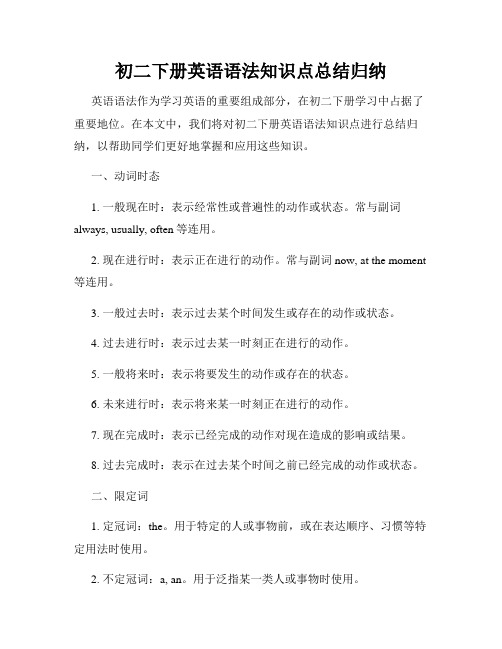
初二下册英语语法知识点总结归纳英语语法作为学习英语的重要组成部分,在初二下册学习中占据了重要地位。
在本文中,我们将对初二下册英语语法知识点进行总结归纳,以帮助同学们更好地掌握和应用这些知识。
一、动词时态1. 一般现在时:表示经常性或普遍性的动作或状态。
常与副词always, usually, often等连用。
2. 现在进行时:表示正在进行的动作。
常与副词now, at the moment 等连用。
3. 一般过去时:表示过去某个时间发生或存在的动作或状态。
4. 过去进行时:表示过去某一时刻正在进行的动作。
5. 一般将来时:表示将要发生的动作或存在的状态。
6. 未来进行时:表示将来某一时刻正在进行的动作。
7. 现在完成时:表示已经完成的动作对现在造成的影响或结果。
8. 过去完成时:表示在过去某个时间之前已经完成的动作或状态。
二、限定词1. 定冠词:the。
用于特定的人或事物前,或在表达顺序、习惯等特定用法时使用。
2. 不定冠词:a, an。
用于泛指某一类人或事物时使用。
3. 0冠词:不用于特指或泛指的情况下,直接使用名词。
4. 指示代词:this, that, these, those。
用于指示特定的人或事物。
5. 物主代词:my, your, his, her, its, our, their。
表示所属关系。
三、形容词和副词的比较级和最高级1. 一般形容词和副词的比较级和最高级:在一般情况下,形容词和副词的比较级在词尾加er,最高级在词尾加est。
2. 以e结尾的形容词和副词:在比较级和最高级前加r或st。
3. 以辅音字母+y结尾的形容词和副词:变y为i,再加er或est。
4. 双写结尾字母的形容词和副词:在比较级和最高级前双写结尾字母,再加er或est。
四、名词性从句1. 主语从句:由what, who, which, whether等引导的从句,在句子中作主语。
2. 宾语从句:由that, if, whether等引导的从句,在句子中作宾语。
高二英语下册知识点归纳材料必看考点

高二英语下册知识点归纳材料必看考点对于18岁的我们来说,有些事情的确会影响我们的一生,比如高考,高考是人生中最重要的转折点之一!以下是作者整理的有关高考考生必看的高二英语下册知识点归纳,期望对您有所帮助,望各位考生能够爱好。
高二英语下册知识点归纳1Ⅰ.Hot words and hot phrases常用词与常用词组1.Medical studies show that AIDS virus cannot be transmitted via the following routes:cups,glasses,toilet seats,swimming pools,mosquitoes,other insects or blood donation.(P.49)2.AIDS is a disease that breaks down the body s immune system and leaves a person defenceless against infections and illness.(P.51)3.People get AIDS after having been infected with the HIVvirus.(P.51)4.People transmit HIV by having unprotected sex,by receiving infected blood transfusions or,as in Xiaohua s case,throughbirth.(P.51)5.Xiaohua s mother contracted the HIV virus when she was 28,and she died of AIDS only three years after Xiaohua was born.(P.51)6.The disease is spreading faster in Africa and parts of Asia,mainly because of a lack of proper health care,prevention and education.(P.51)7.The drugs that are available are much too expensive anddifficult to find.(P.51)8....but she does not let that knowledge discourage her.(P.51)9.She also goes to visit other AIDS patients in hospitals across the country to support them and cheer them up.(P.51)10.The disease is not the only thing that AIDS patients have to suffer from.(P.52)11....that can persuade hospitals and companies to allocate more funds for AIDS research and education.(P.52)12.Xiaohua has learnt to live with HIV and the fact she will eventually get AIDS.(P.52)13.Two years ago,Dr Richards had asked me a great many questions and had taken samples of my blood.(P.55)14.Mum held my hand and I saw that she was weeping.(P.55)15.Cancer is a disease that begins in cells.(P.55)16.In my body,the production of cells is disrupted.(P.55)17.Doctors do know that cancer is not caused by injury and is not contagious—it does not spread from one person to another.(P.55)18.The cancer in my body has been defeated for the moment.(P.55)19.Living with cancer has made me realize how precious life is and how important it is for us to take every chance to live life to the fullest.(P.55)20.Every day is a new opportunity and I have learnt to appreciate every minute of each day.Ⅱ.Language points and grammar focus语言点和语法重点nguage points语言点1.HIV/AIDS is incurable...(P.49)AIDS is a disease that...leaves a person defenceless against infections and illness.(P.51)本单元中由前缀或后缀派生出的反义词的小结2.People get AIDS after having been infected with the HIVvirus.(P.51)完成时的动名词的被动式的内涵及用法3.As with most diseases and disasters,the young suffer the most.“定冠词 + 形容词/过去分词”表示“一类人”的用法的小结4.I had been feeling sick for a long time and my mum had taken me to hospital to have me examined.(P.55)1)过去完成进行时的内涵及用法2)“to have + 宾语 + 过去分词”的两个内涵及用法5.The treatment was successful and I was able to go home after exactly fourteen months,two days and six hours in hospital.(P.55) was/were able to do与could do在内涵上的区分及各自的用法6.I have been living with cancer for two years and...(P.55)现在完成进行时的内涵及用法Ⅲ.Skills of the four essential abilities:listening,speaking,reading and writing听、说、读、写四项基本能力的学习技能1.Listening:Master the main idea of a long dialogue through the inner connections among the questions so as to have better understanding of the questioned details从各设问间的内在联系掌控较长对话的中心思想,更好知道各检测点的细节2.Speaking:Talk about deadly diseases and attitudes towards AIDS,cancer,etc.关于那些致命疾病及对待艾滋病、癌症等的态度的谈论3.Reading:Make full use of informational words and phrases充分利用信息词4.Writing:How to write a personal narrative如何写一篇个人经历过的叙述性故事高二英语下册知识点归纳2一、不定式做主语:1、不定式做主语一样表示具体的某次动作。
初二下册英语重点知识点

初二下册英语重点知识点1. 动词时态及用法- 一般现在时:表示经常发生的动作、惯、真理等。
- 一般过去时:表示过去某个时间发生的动作或存在的状态。
- 一般将来时:表示将来某个时间要发生的动作或存在的状态。
- 现在进行时:表示现在正在进行的动作。
- 过去进行时:表示过去某个时间正在进行的动作。
- 现在完成时:表示过去发生的某个动作对现在有影响或结果。
- 过去完成时:表示过去某个时间之前已经发生的动作。
2. 名词的单复数- 一般情况下,名词的复数形式在词尾加 -s。
- 以 s, x, sh, ch 结尾的名词,复数形式在词尾加 -es。
- 以辅音字母 + y 结尾的名词,将 y 改成 i,再加 -es。
- 以 f 或 fe 结尾的名词,复数形式将 f 或 fe 改成 v,再加 -es。
- 特殊名词复数形式需记忆。
3. 形容词的比较级和最高级- 一般情况下,形容词的比较级在词尾加 -er。
- 以 e 结尾的形容词,只需在词尾加 -r。
- 以辅音字母 + y 结尾的形容词,将 y 改成 i,再加 -er。
- 以重读闭音节的单音节或多音节形容词,双写最后一个辅音字母,再加 -er。
- 形容词的最高级在词尾加 -est。
- 有些形容词和副词的比较级和最高级需记忆。
4. 冠词的用法- 不定冠词 a/an:用于表示泛指或一种不确定的事物。
- 定冠词 the:用于表示特指或已知的事物。
- 零冠词:当名词表示一般概念,或泛指一类事物时,不使用冠词。
5. 介词的用法- 表示时间的常用介词有 at, in, on。
- 表示地点的常用介词有 in, on, at, to。
- 表示方式的常用介词有 by, with, in。
- 表示原因的常用介词有 because of, due to, owing to。
- 表示目的的常用介词有 to, for, in order to。
6. 疑问句的构成- 一般疑问句:将助动词提到句首,或直接在句首加问句词。
初一下册英语知识点总结归纳

初一下册英语知识点总结归纳一、词汇1. 常用单词:如人称代词、颜色、数字、时间、家庭成员等。
2. 动词:如be动词、情态动词、实义动词等。
3. 形容词和副词:如描述人物特征、事物性质等的形容词,以及表示程度、方式等的副词。
4. 介词和连词:如表示位置、时间、原因等的介词,以及连接句子、词语等的连词。
5. 短语和固定搭配:如常用的动词短语、形容词短语、副词短语等。
二、语法1. 时态:如一般现在时、一般过去时、一般将来时等。
2. 语态:如主动语态和被动语态。
3. 句型:如陈述句、疑问句、祈使句、感叹句等。
4. 从句:如宾语从句、定语从句、状语从句等。
5. 主谓一致:如主语和谓语在人称和数上要保持一致。
6. 直接引语和间接引语:如将直接引语转化为间接引语的规则。
7. 比较级和最高级:如形容词和副词的比较级和最高级的构成和用法。
8. 不定代词:如some, any, no, every等不定代词的用法。
9. 冠词:如a, an, the的用法。
10. 名词性从句:如主语从句、宾语从句、表语从句等的用法。
三、阅读理解1. 阅读技巧:如快速浏览文章,找出关键词,理解文章大意等。
2. 阅读题型:如选择题、填空题、判断题等。
3. 阅读材料:如故事、新闻报道、广告等不同类型的阅读材料。
四、写作1. 书写规范:如字母大小写、标点符号的使用等。
2. 句子结构:如简单句、并列句、复合句等的构成和用法。
3. 段落结构:如开头段、主体段、结尾段的写作方法。
4. 作文类型:如记叙文、说明文、议论文等不同类型的作文写作。
五、听力和口语1. 听力技巧:如预测答案、注意关键词等。
2. 听力题型:如听对话选择正确答案、听短文回答问题等。
3. 口语表达:如问候、介绍自己、询问信息等常用口语表达。
4. 口语练习:如角色扮演、对话练习等口语训练方法。
六、文化知识1. 英语国家的文化习俗:如节日庆祝活动、饮食习惯等。
2. 英语国家的地理知识:如国家名称、地理位置等。
一年级英语下册重点单词句子及学习方法
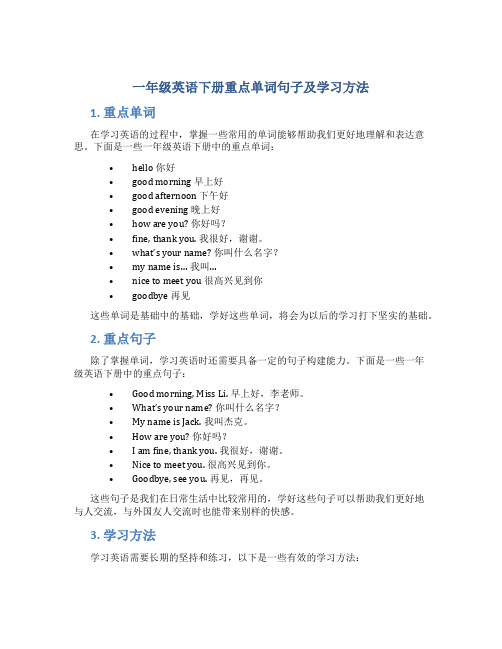
一年级英语下册重点单词句子及学习方法1. 重点单词在学习英语的过程中,掌握一些常用的单词能够帮助我们更好地理解和表达意思。
下面是一些一年级英语下册中的重点单词:•hello 你好•good morning 早上好•good afternoon 下午好•good evening 晚上好•how are you? 你好吗?•fine, thank you. 我很好,谢谢。
•what’s your name? 你叫什么名字?•my name is… 我叫…•nice to meet you 很高兴见到你•goodbye 再见这些单词是基础中的基础,学好这些单词,将会为以后的学习打下坚实的基础。
2. 重点句子除了掌握单词,学习英语时还需要具备一定的句子构建能力。
下面是一些一年级英语下册中的重点句子:•Good morning, Miss Li. 早上好,李老师。
•What’s your name? 你叫什么名字?•My name is Jack. 我叫杰克。
•How are you? 你好吗?•I am fine, thank you. 我很好,谢谢。
•Nice to meet you. 很高兴见到你。
•Goodbye, see you. 再见,再见。
这些句子是我们在日常生活中比较常用的,学好这些句子可以帮助我们更好地与人交流,与外国友人交流时也能带来别样的快感。
3. 学习方法学习英语需要长期的坚持和练习,以下是一些有效的学习方法:(1)记忆单词记忆单词需要我们采用科学的方法,多看、多听、多读、多写,帮助我们快速掌握单词的拼写和意思。
比如学习单词“hello”,最好的方法就是背诵这个单词,同时配合图示,帮助我们形象记忆这个单词。
(2)听说读写结合学习英语需要我们耳听为虚,眼见为实。
在学习单词时,可以借助各种方式向自身不同方式灌输单词。
同时,学习英语不可缺少的一步是语音朗读,多模仿原音,快速提高口语水平。
年级下册英语重点句
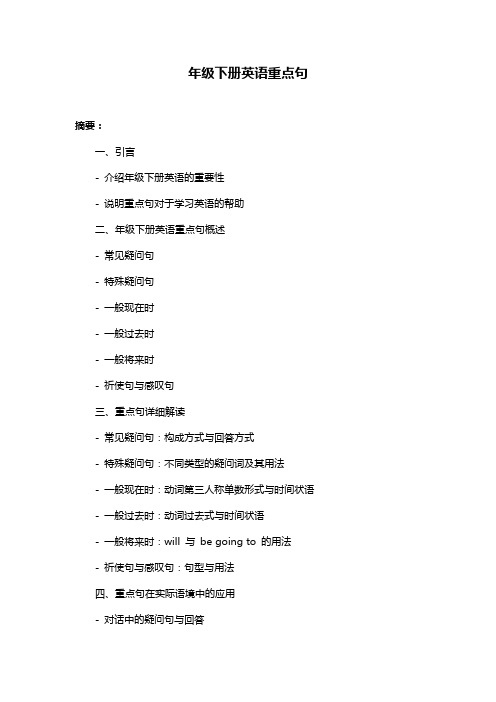
年级下册英语重点句摘要:一、引言- 介绍年级下册英语的重要性- 说明重点句对于学习英语的帮助二、年级下册英语重点句概述- 常见疑问句- 特殊疑问句- 一般现在时- 一般过去时- 一般将来时- 祈使句与感叹句三、重点句详细解读- 常见疑问句:构成方式与回答方式- 特殊疑问句:不同类型的疑问词及其用法- 一般现在时:动词第三人称单数形式与时间状语- 一般过去时:动词过去式与时间状语- 一般将来时:will 与be going to 的用法- 祈使句与感叹句:句型与用法四、重点句在实际语境中的应用- 对话中的疑问句与回答- 描述日常生活的一般现在时与一般过去时- 对未来的预测与计划- 表达感情与命令五、结论- 总结年级下册英语重点句的重要性- 强调掌握重点句对于英语学习的关键作用正文:英语作为我国义务教育阶段的一门重要学科,对于学生的全面发展具有不可忽视的作用。
在年级下册的英语学习中,重点句的掌握尤为关键。
本文将对年级下册英语重点句进行详细解读,以帮助学生更好地掌握英语语法。
首先,我们来了解一下年级下册英语重点句的概述。
重点句包括常见疑问句、特殊疑问句、一般现在时、一般过去时、一般将来时、祈使句与感叹句。
这些句型在英语学习中具有基础性地位,掌握这些重点句对于提升英语水平具有重要意义。
接下来,我们将详细解读这些重点句。
1.常见疑问句:疑问句是英语中的一种基本句型,用于询问信息。
一般疑问句的构成方式是:助动词/情态动词+ 主语+ 谓语;特殊疑问句则是通过加入特定的疑问词来询问信息,例如:What is your name?2.特殊疑问句:特殊疑问句用于询问具体的信息,例如:Where are you from? 不同类型的疑问词有各自的用法,需要学生在实际语境中灵活运用。
3.一般现在时:一般现在时表示现在的状态、习惯或一般事实。
动词在第三人称单数形式时需要加上“-s”或“-es”,如:he/she/it reads。
- 1、下载文档前请自行甄别文档内容的完整性,平台不提供额外的编辑、内容补充、找答案等附加服务。
- 2、"仅部分预览"的文档,不可在线预览部分如存在完整性等问题,可反馈申请退款(可完整预览的文档不适用该条件!)。
- 3、如文档侵犯您的权益,请联系客服反馈,我们会尽快为您处理(人工客服工作时间:9:00-18:30)。
四年级英语下册
1. A: Where is the canteen? (食堂在哪?)
B: It’s on the first floor.(在一楼。
)
2. A: How many students are there in your class? (在你们教室里有多少学生?)B: Forty-five. (有45人。
)
3. A: Do you have a library? (你们有图书馆吗?)
B: Yes . The library is on the first floor . This way , please.
(是的。
图书馆在一楼。
请这边走。
)
4. A: Is that the art room? (那是美术教室吗?)
B: No, it isn’t. It’s the music room.(不是,那是音乐室。
)
5. A: What time is it? (几点了?)
B: It’s nine o’clock.. It’s time for English cla ss.(九点了,要上英语课了。
)6. A: What time is it? (几点了?)
B:It’s 7:05. It’s time to go to school.(7:05,该上学了。
)
7. A: Whose is it? (它是谁的?)
B: It’s my T-shirt. Please pass me my T-shirt. (我的体恤衫。
请把体恤衫给我。
)8. A: These are your baby pants. (这些是你孩子的长裤。
)
B: They’re so small. An d those are my shoes。
(它们太小了。
那双是我的鞋子。
)9. A: What colour is it ? (它是什么颜色的?)
B: It’s white.(白色的。
)
10.A: What are they? (是什么?)
B: They are jeans. (是牛仔裤。
)
上半部分四会(认、读、说、写)句子和词语
This is my computer. That is your computer. Is this a teacher’s d esk? Yes, it is.
What time is it?
It’s two o’clock..It’s 9:45.
It’s time for math class. Is this your T-shirt? No, it’s not.
What colour is it?
It’s white.
Unit 1
computer(计算机) board(写字板) fan(风扇) light(灯) this(这;这个) is(是) my(我的) that(那;那个) your(你的) teacher’s desk(讲台) picture(图画;照片) wall(墙壁) floor(地板) yes(是;是的) it(它)
Unit 2
one(一) two(二) three(三) four(四) five(五) six(六) seven(七) eight(八) nine(九) ten(十) what(什么) time(时间) it’s=it is …o’clock(…点钟) math(数学) Chinese(语文) English(英语) P.E.(体育) music(音乐) for(为;给) class(课程)
Unit 3
jacket(夹克衫) shirt(衬衫) skirt(裙子) dress(连衣裙) T-shirt(T恤衫)
red(红色的) blue(蓝色的) yellow(黄色的) green(绿色的) white(白色的) no(不;不是) not(不;不是的) colour(颜色)
1. A: Can I wear my new shirt today? 今天我能穿我的新衬衫吗?
B: No, you can’t . It’s cold.不能,太冷了。
2. A: Where are my shoes? 我的鞋子在哪儿?
B: They are on your feet. 它们在你的脚上。
3. A:What’s the weather like in Beijing?北京的天气怎样?
B: It’s ra iny today. 今天是雨天。
4. A: What’s the matter,Amy?艾米,怎么了?
B: It’s windy now.I have to close the window.现在刮风。
我必须关窗。
5. A: This dress is nice . It fits me well. How much is this dress?
这件连衣裙很美。
适合我。
这件连衣裙多少钱?
B: It’s ninety-nine yuan. 99元。
A: I’ll take it.我要买下。
6. A: What size? 几码?
B: Size five. 5码
7. A: How much are they ? 它们多少钱?
B: They’re thirty-five yuan. 35元。
8. A: This farm is so big .Are they sheep? 这农场很大。
它们是绵羊吗?
B: No, they aren’t.They are goats.不是。
它们是山羊。
9. A: How many cows do you have? 你有多少只牛?
B: One hundred. 一百只。
10. A: What do you see in the picture? 图片里你看到什么?
B: I see five cats, eight rabbits and two pigs. 我看到5只猫,8只兔子和2只猪。
11. A: How many geese can you see? 你能看到多少只鹅?
B: Let me see….Three.让我看看。
三只。
13. A: Are these tomatoes? 这些是西红柿吗?
B: Yes, they are. 是的。
14. A: Are those cucumbers? 那些是青瓜吗?
B: No, they aren’t.不是。
15. A:How many horses are there? 有多少只马?
B:Twelve. 十二只。
下半部分四会(认、读、说、写)句子和词语
It’s warm today. Let’s play football. It’s cool.
Is it cold?
Yes, it is. / No, it isn’t. It’s hot.
How much is it?
It’s ten yuan.
Unit 4
warm(暖和的) cold(寒冷的) cool(凉爽的) today(今天) jeans(牛仔裤) pants(长裤) socks(袜子) shoes(鞋子) let’s=let us play(玩;踢)
football(足球)
snowy(下雪的) sunny(晴朗的) Unit 5
how much(多少钱)
big(大的) small(小的)
long(长的) short(短的) How much are they?
They’re three yuan.
Are they ducks?
No, they aren’t.
How many horses are there?
Twelve.
apple(苹果) banana(香蕉)
pear(梨) orange(橙子) watermelon(西瓜)
are(是) they 它(他、她)们
Unit 6
horse(马) aren’t=are not
cat(猫) rabbit(兔子)
pig(猪) duck(鸭子) dog(狗) eleven(十一) twelve(十二) thirteen(十三) fifteen(十五) twenty(二十) there(那儿;那里) how many(多少)。
